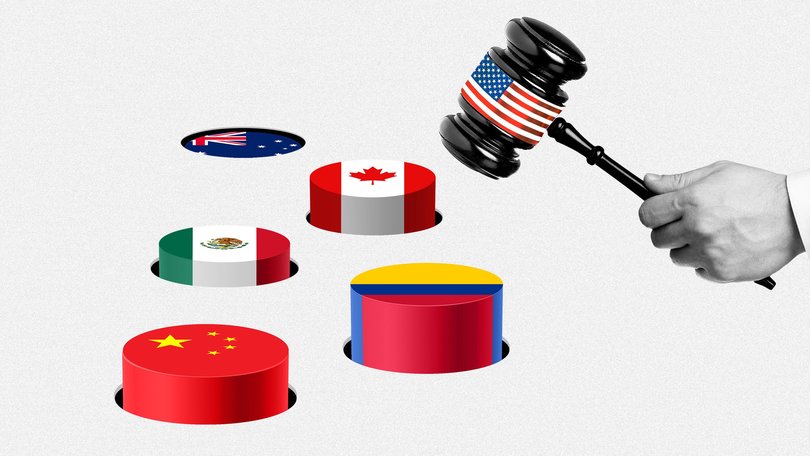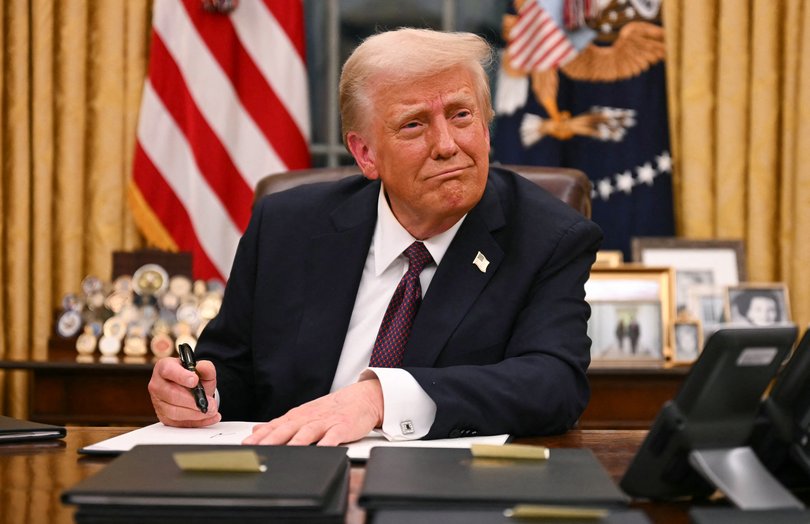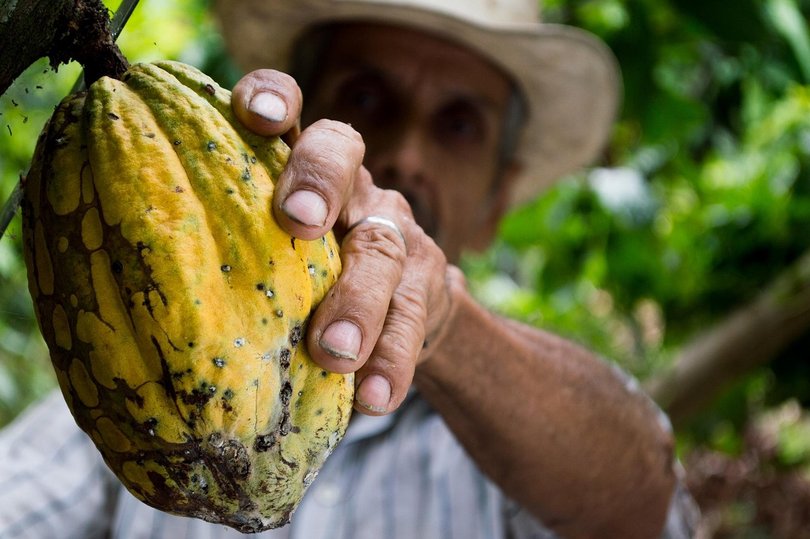JACKSON HEWETT: Trump’s 25 per cent tariff on Colombia sets alarming precedent for global price of goods
JACKSON HEWETT: How prepared is Australia for an era where gunboat diplomacy threatens to spill into a wider trade war, or rebalance the world order?

President Trump’s tariff whack-a-mole has begun and while he has quickly crushed one opponent, a far more insidious one could well pop up.
Mr Trump’s 25 per cent tariff, rising to 50 per cent on Colombian imports if it didn’t accept two planeloads of deportees, saw swift capitulation.
After all, Colombia had little choice, given a third of its exports end up in America.
Sign up to The Nightly's newsletters.
Get the first look at the digital newspaper, curated daily stories and breaking headlines delivered to your inbox.
By continuing you agree to our Terms and Privacy Policy.The speed and severity of the threat has rattled world leaders, given the historically close ties the countries shared.
Treasurer Jim Chalmers is confident Australia can avoid Colombia’s fate.
“I’m confident that we can navigate the different policies which come from a change of administration in the US,” Dr Chalmers told Sky News.
“The Americans run a trade surplus with us. We’ll work very closely with American colleagues and counterparts to make sure that the change in administration, the change in policies that we expect to see out of DC.”

The Treasurer says Australia is well placed to deal with Mr Trump’s tariff policies, but how prepared is Australia for an era where gunboat diplomacy — such as that exercised over Colombia — threatens to spill into a wider trade war, or a rebalancing of the global order?
Remember Covid?
The supply chain disruption wrought by the pandemic is becoming a faded memory.
At its height, people were coming to blows in supermarket aisles over toilet paper.
Now, we’re scrutinising decimal points to determine whether we’re sustainably close enough to 3 per cent to justify a 0.25 per cent decrease on mortgage payments.
That’s the problem with inflation. So pernicious is its effect that slight deviations can dictate the fate of governments.
Cost of living — now so ubiquitous a concern we call it cozzie livs — eats away at trust in institutions, perceptions of fairness and the perceived competence of governments.
Take housing as an example. Young people can’t see a bright future because of affordability, but often fail to appreciate that a significant percentage of a developer’s costs come via materials — many imported. And it’s not just the hard cost of the landed product. Often more damaging are delays in delivery, blowing out completion times and increasing interest payments, wage pressures from rescheduling labour and so on.
COVID, and Russia’s invasion of Ukraine sent global inflation to a peak not seen since another geopolitical crisis – the Arab oil embargo of the 1970s that caused high prices to cascade into the 1980s.
The inflation shock that peaked in 2022 is still yet to abate, according to a paper by the renowned Brookings Institution.
While the immediate shock of empty shelves sent prices for scarce items soaring, the longer-term effect is less well understood.
The Brookings Institution paper, co-authored by the former head of President Obama’s budget office, concluded the more significant inflationary impact was businesses adjusting to supply chain volatility by increasing their profit margins.
It found that while delivery times for supplies fell back to pre-COVID levels by late 2022 – and are now below the long term average – company margins have taken far longer to fall, and still haven’t returned to trend.
“Inventory managers may be slow to normalize margins because the shock of empty shelves at the height of COVID-19 was so severe. High inflation after delivery times normalized may thus still have supply disruptions as its primary driver,” the authors found.
The Brookings paper concludes this ongoing margin pressure is about preserving stability during shocks rather than profiteering, which begs the question: how will companies respond to a world where tariffs can be applied to key products in any given moment?
Take coffee.
Imagine you are the CEO of Starbucks in a year where the price of coffee has spiked 68 per cent, driven by extreme drought in Brazil and Vietnam.
Just as you are trying to keep a lid on costs, you hear Colombia, third largest exporter of coffee worldwide, is about to be hit with a 25 per cent tariff, that you, the buyer will have to pay. You call every distributor you know, who in turn calls every producer who immediately start rubbing their hands with glee.
Thank God Colombia caved, you sigh, but now you are worried. Brazil is 30 per cent of the global coffee market, and it has a left wing government.
It was bad enough when that severe drought in Brazil wiped out supply, and with it my margins, you think, so now I must plan for a world where tariffs could be introduced at any time.
Oh, and while I am worried about coffee, the cocoa that goes into my mochas, and the choc-chip cookies with the higher margins, has also spiked 90 per cent thanks to disease outbreaks and extreme heat. My suppliers are in Africa, and who knows what beef an African leader might end up in with Mr Trump.

I’d better hold greater inventories of coffee and chocolate to ensure I am hedged against a price spike, or even my stock being held up at the border.
Excess inventory costs money. It eats up cash flow, it takes up warehouse space, it has to be properly managed to ensure it doesn’t deteriorate, so I will have to put up prices to compensate, or shrink the size of my product and hope that no-one notices.
Now play that scenario across every board room in America, Australia, and every other country and you have the ingredients for a breakout in inflation.
Cozzie Livs
This election, like almost every election across the world in the past 12 months, is effectively being fought over the cost of living.
Dr Chalmers is pitching to voters that he has kept Australians shielded from the worst of the inflationary impacts.
Where other countries saw a significant rise in unemployment, Australians are experiencing the strongest job market in generations as government spending and high immigration prevented the country from slipping into a technical recession, Dr Chalmers maintains.
Rent assistance and electricity rebates have eased the inflationary impact on households of policy failures that should have been resolved long ago.
That has come at a significant cost to the budget and Dr Chalmers is arguing that without it the pain would have been far worse. Even with the handouts, voters continue to mark the government down for failing to get costs under control, which is why every pronouncement from the government over the next few weeks will be trying to convince voters that things could have been worse.
“We see these polls. I think they’ll come out with increasing regularity between now and the election. We understand that. They reflect the pressures that people genuinely feel,” Dr Chalmers said today.
“Cheaper early education, cheaper medicines, student debt relief, fee-free TAFE, getting wages moving again, these are these are the things we’re focused on. We’ve budgeted for them, we’re rolling them out right now. And that’s because more than acknowledge that people are under pressure, we’re doing something about it in the most responsible way that we can.”
Globalisation and its discontents
All politics is local and this election will be won or lost on voters’ perception of economic wellbeing in the face of inflation.
With this tariff tempest, Mr Trump will unwittingly weigh on the fortunes of every Australian. Not that he cares.
America has the heft to balance the economic scales in its favour, but every small nation will be the ones who have to adjust.
If inflation goes up again — whether via goods inflation as a result of tariff-disrupted supply chains or a lower dollar as capital is sucked into the US as a result of Mr Trump’s thumb on the scale — Australians will feel even worse off.
The Reserve Bank won’t be able to cut rates substantially and borrowing from future generations to pay for today’s pressures is not a long term strategy.
An enfeebled China will reduce the income on which the country relies
Australians are worried about the short term, but as the world becomes more chaotic, it’s the long term where they are looking for reassurance.

